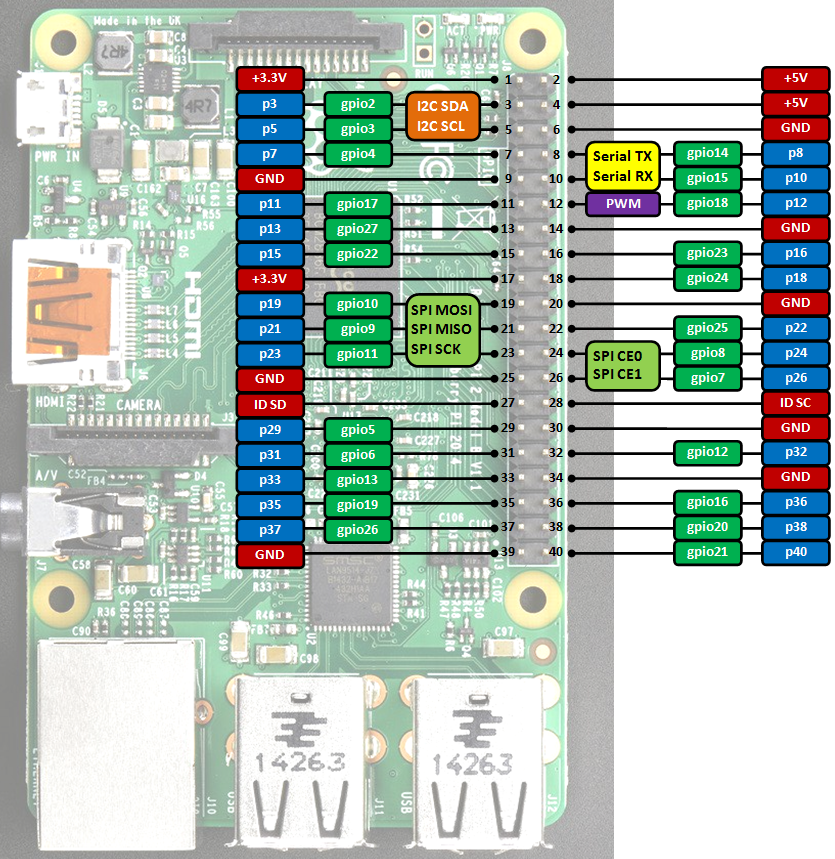mbed API for Raspberry Pi boards.
mbedPi
This is an attempt to implement a limited number of mbed APIs for Raspberry Pi single-board computers. The project was inspired by and based on the arduPi library developed for the Arduino by Cooking Hacks .
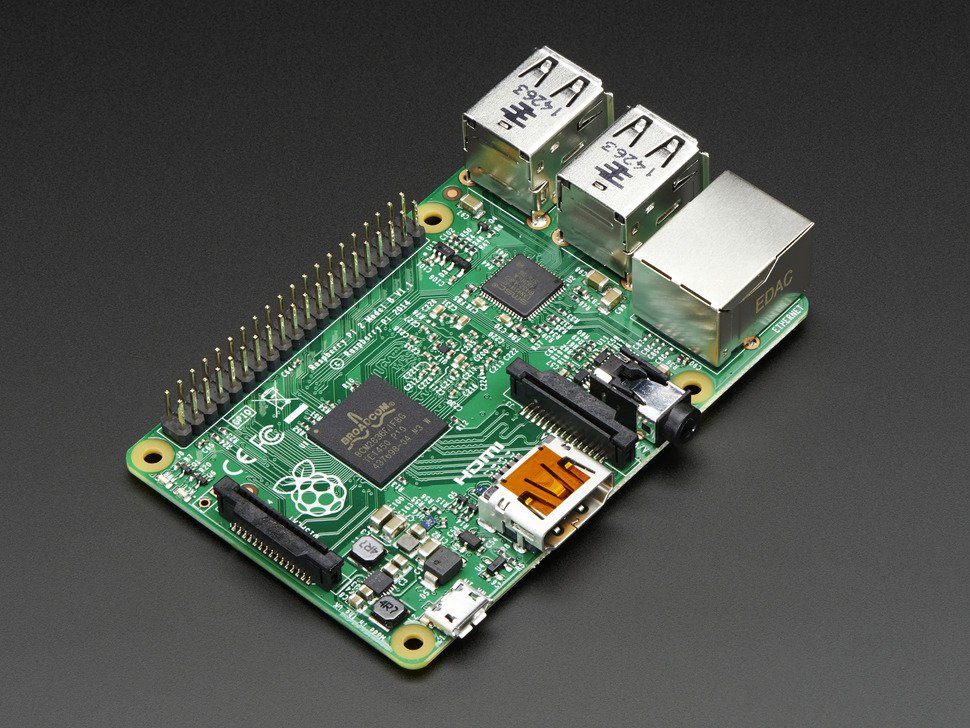
Specifications
- Chip: Broadcom BCM2836 SoC
- Core architecture: Quad-core ARM Cortex-A7
- CPU frequency: 900 MHz
- GPU: Dual Core VideoCore IV® Multimedia Co-Processor
- Memory: 1GB LPDDR2
- Operating System: Boots from Micro SD card, running a version of the Linux operating system
- Power: Micro USB socket 5V, 2A
Connectors
- Ethernet: 10/100 BaseT Ethernet socket
- Video Output: HDMI (rev 1.3 & 1.4)
- Audio Output: 3.5mm jack, HDMI
- USB: 4 x USB 2.0 Connector
- GPIO Connector: 40-pin 2.54 mm (100 mil) expansion header: 2x20 strip providing 27 GPIO pins as well as +3.3 V, +5 V and GND supply lines
- Camera Connector: 15-pin MIPI Camera Serial Interface (CSI-2)
- JTAG: Not populated
- Display Connector: Display Serial Interface (DSI) 15 way flat flex cable connector with two data lanes and a clock lane
- Memory Card Slot: Micro SDIO
GPIO connector pinout
Information
Only the labels printed in blue/white or green/white (i.e. p3, gpio2 ...) must be used in your code. The other labels are given as information (alternate-functions, power pins, ...).
Building programs for the Raspberry Pi with mbedPi
I use Qt Creator for development, however you can use any other IDE available on the Raspberry Pi (e.g. Geany) if you like. For a quick try:
- Install Qt and the Qt Creator onto your Raspberry Pi. Then create a new "Blinky" Plain non-Qt C++ Project as follows:
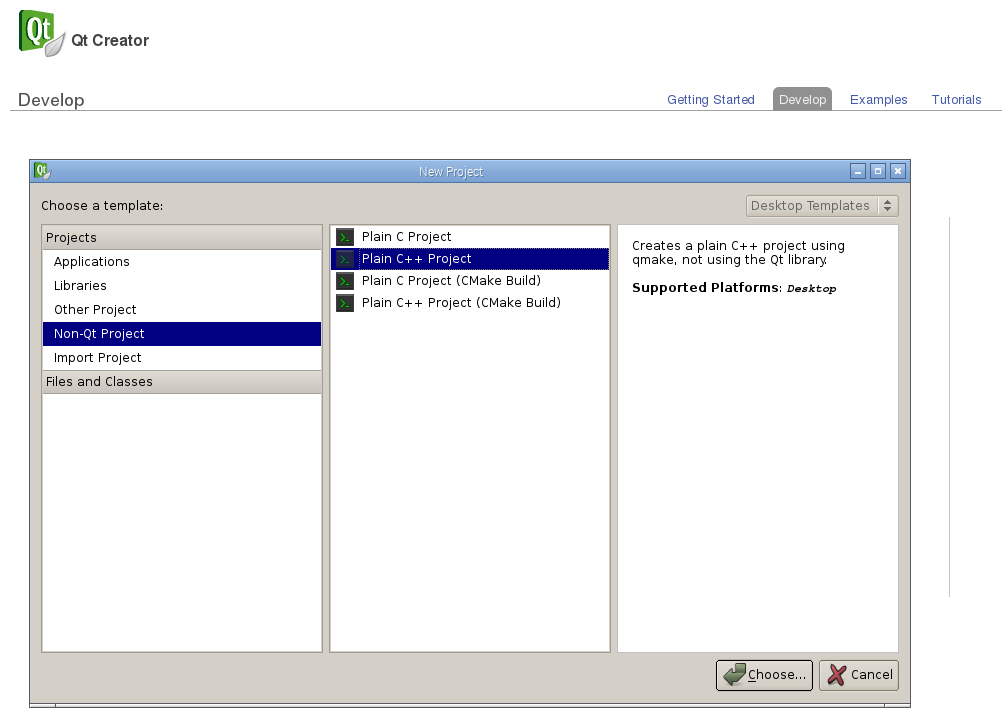
- Change the main code as below:
main.cpp
#include "mbedPi.h"
int main()
{
DigitalOut myled(p7);
while(1) {
myled = 1; // LED is ON
wait(0.2); // 200 ms
myled = 0; // LED is OFF
wait(1.0); // 1 sec
printf("Blink\r\n");
}
}
- Copy the mbedPi.zip file into your project's folder and unzip.
- Add the mbedPi.h and mbedPi.cpp files to your project by right clicking on the "Blinky" project and then clicking on the "Add Existing Files..." option in the local menu:
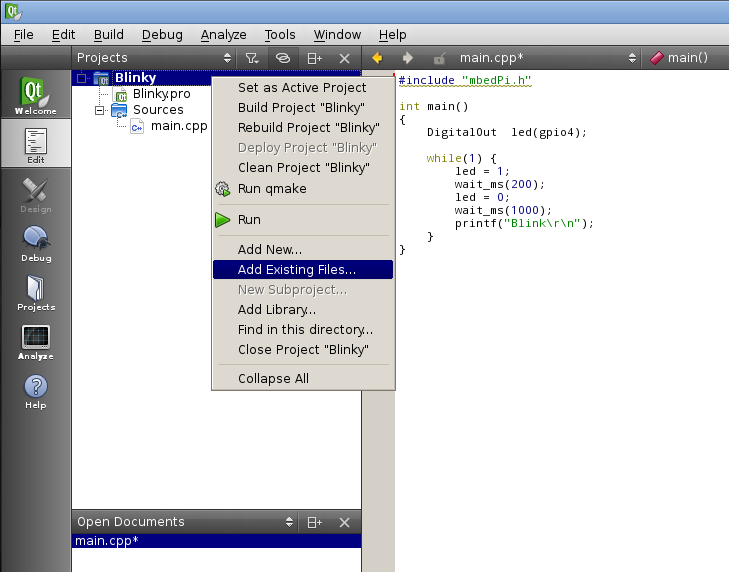
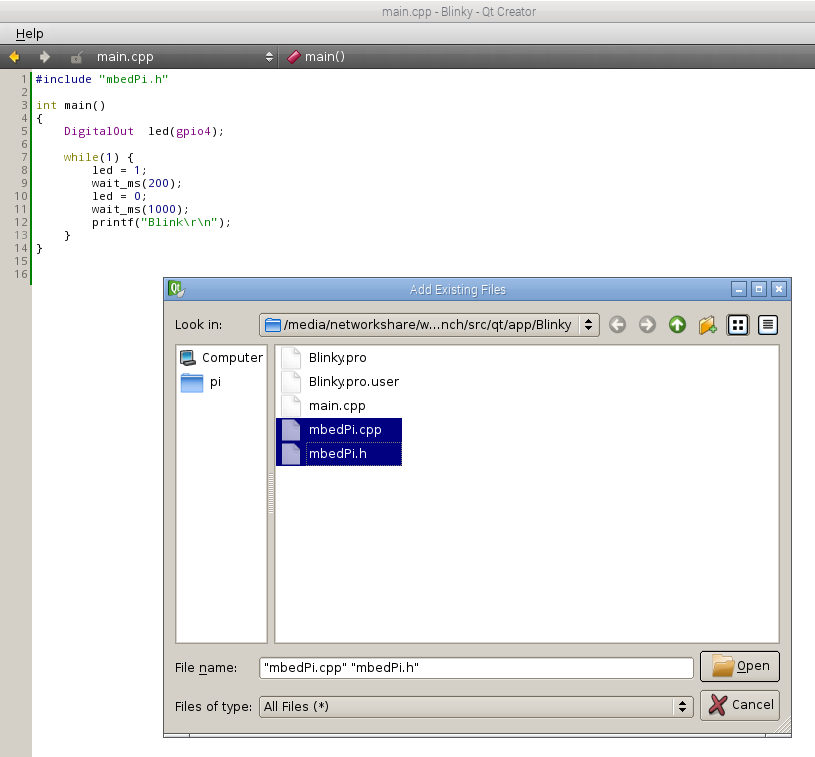
- Double click on Blinky.pro to open it for editing and add new libraries by inserting a new line as follows:
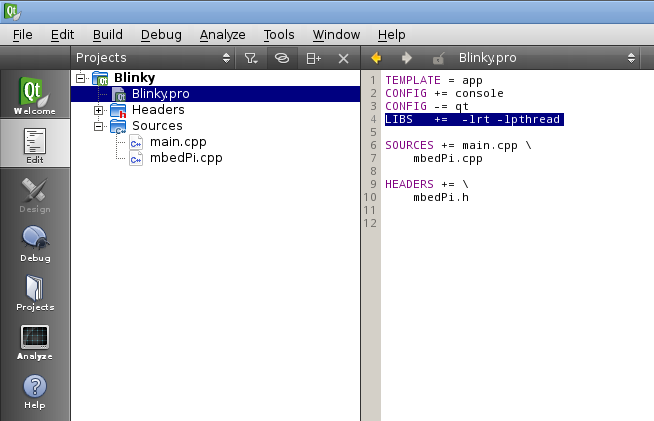
- Compile the project.
- Connect an LED through a 1k resistor to pin 7 and the ground on the Raspberry Pi GPIO connector.
- Run the binary as sudo (sudo ./Blinky) and you should see the LED blinking.

- Press Ctrl+c to stop running the application.
source/Thread.cpp
- Committer:
- hudakz
- Date:
- 18 months ago
- Revision:
- 2:131555dc6fb7
- Parent:
- 1:1f2d9982fa8c
File content as of revision 2:131555dc6fb7:
/*
* Copyright (C) 2016 Zoltan Hudak
* hudakz@outlook.com
*
* Parts Copyright (C) Libelium Comunicaciones Distribuidas S.L.
* http://www.libelium.com
*
* This program is free software: you can redistribute it and/or modify
* it under the terms of the GNU General Public License as published by
* the Free Software Foundation, either version 3 of the License, or
* (at your option) any later version.
*
* This program is distributed in the hope that it will be useful,
* but WITHOUT ANY WARRANTY; without even the implied warranty of
* MERCHANTABILITY or FITNESS FOR A PARTICULAR PURPOSE. See the
* GNU General Public License for more details.
*
* You should have received a copy of the GNU General Public License
* along with this program. If not, see <http://www.gnu.org/licenses/>.
*
* Version 1.0
*/
#include "Thread.h"
/*$off*/
pthread_t idThread2;
pthread_t idThread3;
pthread_t idThread4;
pthread_t idThread5;
pthread_t idThread6;
pthread_t idThread7;
pthread_t idThread8;
pthread_t idThread9;
pthread_t idThread10;
pthread_t idThread11;
pthread_t idThread12;
pthread_t idThread13;
pthread_t idThread14;
pthread_t idThread15;
pthread_t idThread16;
pthread_t idThread17;
pthread_t idThread18;
pthread_t idThread19;
pthread_t idThread20;
pthread_t idThread21;
pthread_t idThread22;
pthread_t idThread23;
pthread_t idThread24;
pthread_t idThread25;
pthread_t idThread26;
pthread_t idThread27;
pthread_t* idThreads[26] =
{
&idThread2,
&idThread3,
&idThread4,
&idThread5,
&idThread6,
&idThread7,
&idThread8,
&idThread9,
&idThread10,
&idThread11,
&idThread12,
&idThread13,
&idThread14,
&idThread15,
&idThread16,
&idThread17,
&idThread18,
&idThread19,
&idThread20,
&idThread21,
&idThread22,
&idThread23,
&idThread24,
&idThread25,
&idThread26,
&idThread27
};
/*$on*/
/* This is the function that will be running in a thread if
* attachInterrupt() is called */
void* threadFunction(void* args)
{
ThreadArg* arguments = (ThreadArg*)args;
int pin = arguments->pin;
int GPIO_FN_MAXLEN = 32;
int RDBUF_LEN = 5;
char fn[GPIO_FN_MAXLEN];
int fd, ret;
struct pollfd pfd;
char rdbuf[RDBUF_LEN];
memset(rdbuf, 0x00, RDBUF_LEN);
memset(fn, 0x00, GPIO_FN_MAXLEN);
snprintf(fn, GPIO_FN_MAXLEN - 1, "/sys/class/gpio/gpio%d/value", pin);
fd = open(fn, O_RDONLY);
if (fd < 0) {
perror(fn);
exit(1);
}
pfd.fd = fd;
pfd.events = POLLPRI;
ret = unistd::read(fd, rdbuf, RDBUF_LEN - 1);
if (ret < 0) {
perror("Error reading interrupt file\n");
exit(1);
}
while (1) {
memset(rdbuf, 0x00, RDBUF_LEN);
unistd::lseek(fd, 0, SEEK_SET);
ret = poll(&pfd, 1, -1);
if (ret < 0) {
perror("Error waiting for interrupt\n");
unistd::close(fd);
exit(1);
}
if (ret == 0) {
printf("Timeout\n");
continue;
}
ret = unistd::read(fd, rdbuf, RDBUF_LEN - 1);
if (ret < 0) {
perror("Error reading interrupt file\n");
exit(1);
}
//Interrupt. We call user function.
arguments->func();
}
}
/**
* @brief
* @note
* @param
* @retval
*/
pthread_t* getThreadIdFromPin(int pin)
{
int i = pin - 2;
if ((0 <= i) && (i <= 25))
return idThreads[i];
else return NULL;
}
